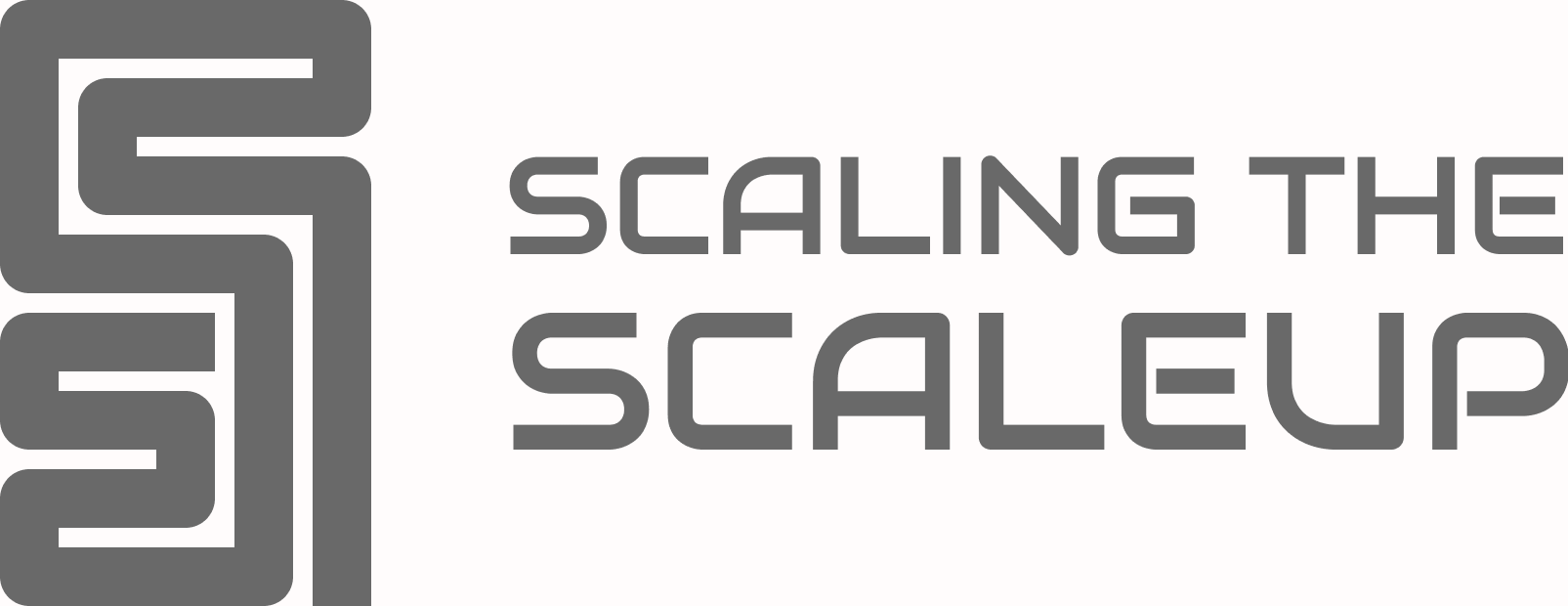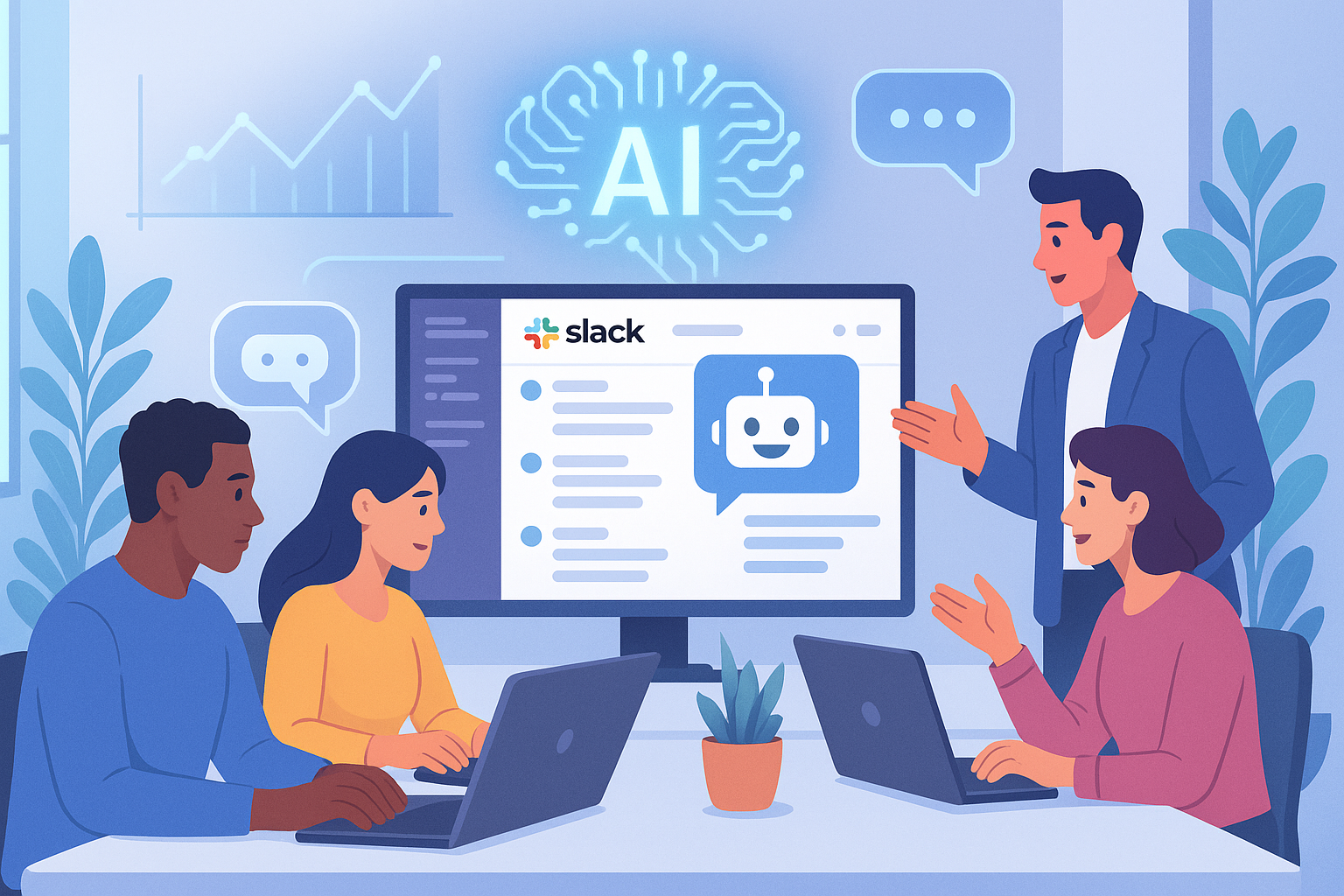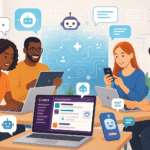The Future of Internal Support in Organizations: Transforming from Wiki Pages to AI-Powered Slack Chatbots
How AI and Slack Chatbots Are Revolutionizing Employee Support for Greater Productivity and Engagement
Introduction
Internal support systems within organizations are undergoing a transformative overhaul, shifting from traditional, static wiki pages to innovative, AI-powered interactive solutions like Slack chatbots. This evolution is fueled by the growing need for dynamic, immediate, and personalized employee assistance—particularly in remote and hybrid work environments. In this article, we examine how the integration of artificial intelligence is redefining internal support through automation, conversational interfaces, and seamless collaboration platforms. We explore the enabling technologies, proven implementation strategies, real-world success stories, and the key challenges organizations encounter on this journey.
From Static Wikis to Dynamic AI: The Evolution of Internal Support
Internal support mechanisms have advanced considerably, moving beyond the confines of static wiki pages that once served as centralized knowledge repositories. While wikis enabled basic information sharing, their rigid structure necessitated manual searches and lacked interactivity. In today’s fast-paced, distributed work environments, these limitations create bottlenecks in timely problem resolution and responsiveness. AI-powered chatbots have bridged this gap, delivering real-time, context-aware support by understanding user intent via natural language processing and large language models. Unlike traditional wikis, these AI-driven tools offer personalized, conversational engagement—enhancing support efficiency, interactivity, and overall satisfaction. The integration of such core technologies signals a critical leap in internal knowledge management, meeting modern workforce expectations and technological capabilities [Source: Hiver].
Technological Foundations: AI, Automation, and Seamless Integrations
At the heart of these advanced internal support systems lie artificial intelligence, machine learning, automation, and predictive analytics. Together, these technologies proactively anticipate employee needs by leveraging historical data and behavioral patterns, thus delivering tailored, efficient support. Automation streamlines repetitive tasks such as information retrieval and ticket logging—enabling human resources to focus on higher-impact issues. By integrating these AI capabilities with collaboration tools like Slack and Microsoft Teams via robust APIs, organizations empower employees to interact with support systems effortlessly within familiar environments. This seamless experience drives higher engagement and accelerates workflows, providing consistent support for both remote and hybrid teams. Ultimately, these innovations translate to faster issue resolution, improved support efficiency, and enhanced employee satisfaction—essentials in a modern workplace [Source: Lindy.ai], [Source: QUE].
Slack Chatbots in Action: Revolutionizing Engagement and Productivity
Slack chatbots are fundamentally transforming internal support functions by automating routine queries and offering 24/7 assistance. With natural language processing at their core, these chatbots provide conversational, responsive interfaces within Slack, swiftly addressing common queries related to IT support, HR procedures, onboarding, and everyday internal communications. For IT, chatbots can troubleshoot device and network issues instantly; for HR, they clarify policies or update leave statuses; and for onboarding, they guide new hires through necessary procedures without the typical delays of human-mediated support. Through automation, these chatbots reduce administrative burden, expedite problem-solving, and free employees to focus on strategic priorities. Tailored responses enhance personalization and engagement, while seamless integration within communication workflows ensures information flows effortlessly. Organizations deploying Slack chatbots consistently report significant cost savings, faster resolutions, and higher employee satisfaction—demonstrating a marked shift in internal support effectiveness [Source: Kayako Blog].
Implementation Best Practices: Maximizing the Value of AI Chatbots
To ensure success with AI-powered internal support, organizations should follow several proven best practices. Defining clear use cases—such as handling routine IT requests or HR FAQs—helps delineate when the chatbot takes the lead and when escalation to human agents is necessary. Developing conversational interfaces that are natural and empathetic fosters positive user engagement, supported by context-aware interactions and a friendly, yet professional tone. Continuous learning through real employee interactions refines the chatbot’s accuracy and expands its vocabulary, including company-specific terminology. Deep integration with enterprise systems—HRIS, ticketing platforms, knowledge bases—delivers personalized, real-time responses. Multilingual support and accessibility further extend inclusivity, while strict adherence to privacy regulations like GDPR builds trust. Finally, tracking key metrics (e.g., resolution rates, satisfaction scores) and educating employees on chatbot benefits promote adoption and ongoing improvement [Source: Kayako].
Case Studies: Real-World Successes and Security Considerations
Numerous organizations have realized substantial benefits through the deployment of Slack chatbots customized for specific internal needs. OpenAI Assistant’s integration with Slack illustrates this well, enabling teams to resolve support tickets and address FAQs directly in their communication channels—resulting in quicker resolutions and preserved conversational context. IBM similarly employs AI agents in its Slack environment to automate routine HR inquiries, which significantly reduces response times and allows HR professionals to focus on strategic initiatives. Custom solutions tailored for customer service and IT operations further streamline processes by automating requests and ticket updates instantly using Slack interfaces. These implementations typically result in measurable time and cost savings, along with increased employee satisfaction due to faster and more consistent support. Nonetheless, organizations must carefully manage security concerns such as data privacy and the potential for AI misuse. Leading practices include adopting zero-trust security frameworks and maintaining robust monitoring to protect sensitive communications and uphold trust [Source: n8n.io].
Challenges and Future Trends in AI-Powered Internal Support
Despite the clear benefits, organizations face several challenges when implementing AI-based support tools. Employee resistance often arises due to concerns about automation replacing human roles, making transparent communication and robust change management vital. Ensuring the accuracy of AI-generated information is equally important; ongoing data quality monitoring safeguards the relevance and reliability of responses. Striking the right balance between automation and the human touch is essential—organizations must maintain clear escalation procedures for complex or sensitive matters to mitigate risks like misinformation or social engineering. Strong security protocols remain crucial to address these vulnerabilities and maintain user trust.
Looking forward, several emerging trends promise to further strengthen internal support systems. Voice assistants will enable hands-free, conversational help; multimodal AI will combine text, voice, and imagery for richer interactions; and predictive support engines will anticipate user needs to provide proactive assistance. For organizations aiming for resilience and agility, the way forward involves investing in adaptive AI, strengthening governance frameworks, and continuously engaging their workforce to harness the collective advantages of human and artificial intelligence [Source: UpTech].
Conclusions
The shift from static wiki pages to AI-powered Slack chatbots represents a pivotal transformation in internal support. By harnessing AI, automation, and seamless integrations with collaboration platforms, organizations can provide immediate, personalized, and proactive assistance to employees, boosting both productivity and satisfaction. However, success requires careful planning in areas like data privacy, user experience, and ongoing training. As future-oriented technologies such as voice interfaces and multimodal AI mature, internal support will become even more intuitive and impactful—cultivating a more agile, engaged, and resilient workforce.
Sources
- Hiver – Future of Customer Service: Trends that Will Shape 2024
- Kayako Blog – The Remarkable Rise of AI Chatbots: How They’re Transforming Customer and Employee Support
- Lindy.ai – AI Agents in Business Applications: Use Cases and Strategies
- n8n.io – Slack + OpenAI Assistant Integration for Direct Messages and Mentions
- QUE – Working Seamlessly with AI Tools in Slack for Enhanced Productivity
- UpTech – AI Trends 2025: What Will Shape the Future



